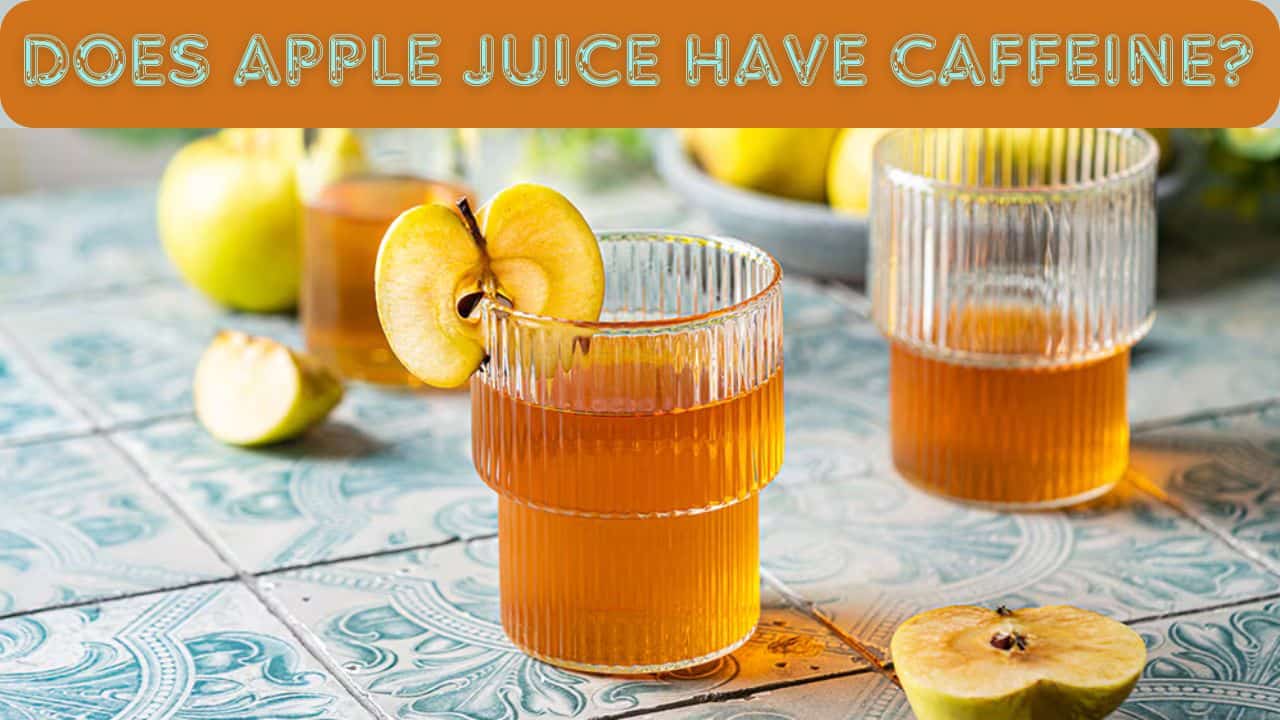You’ve probably heard all kinds of things about caffeine, from its effects on energy levels to how it can impact sleep. But what about apple juice? While most people associate caffeine with coffee or tea, there’s a lot of curiosity about other drinks, too. So, does apple juice have caffeine, or is it the caffeine-free alternative you’ve been looking for? Let’s dive in and find out!
Table of Contents
What Is Apple Juice?
Apple juice is a refreshing beverage that’s enjoyed all around the world. Made from crushed apples, this sweet liquid has been a popular drink for centuries. It’s delicious and comes with its fair share of nutrients. However, a few different types of apple juice are available, depending on how it’s processed.
Types of Apple Juice
There are generally two kinds of apple juice you’ll find on the shelves: clear apple juice and cloudy apple juice. Clear apple juice is filtered to remove pulp, giving it a transparent appearance, while cloudy apple juice contains the natural pulp, which can be healthier due to its fiber content. Both types are made from the same fruit, but their processing can make a difference in texture and nutrient levels.
Does Apple Juice Have Caffeine?
Now for the big question: does apple juice have caffeine? The short answer is no. Apple juice is naturally caffeine-free, making it a great alternative for people who are sensitive to caffeine or want to avoid it altogether.
Apple Juice Variants and Their Caffeine Content
Apple juice comes in a variety of forms, and while the taste and texture may vary, the caffeine content across all types remains consistent—zero caffeine. Let’s explore five popular apple juice variants:
Clear Apple Juice
Clear apple juice is the most common type found in stores. It’s filtered to remove all pulp, leaving it transparent and light. Despite the filtering process, clear apple juice contains no caffeine, making it a safe option for anyone avoiding stimulants.
Cloudy Apple Juice
Cloudy apple juice, also known as unfiltered apple juice, retains more of the pulp and fiber from the fruit, giving it a thicker texture and richer flavor. Like clear apple juice, it has zero caffeine. The additional fiber makes it slightly healthier than clear apple juice.
Freshly Pressed Apple Juice
Freshly pressed apple juice is made directly from fresh apples without any preservatives or pasteurization. It often has a robust, natural flavor with pulp still present. As with all other apple juice variants, it contains no caffeine, offering a natural and refreshing drink.
Organic Apple Juice
Organic apple juice is made from apples grown without the use of synthetic pesticides or fertilizers. It can be either clear or cloudy, depending on the brand, but like other apple juices, it contains no caffeine. Its organic label often appeals to health-conscious consumers.
Apple Juice from Concentrate
Apple juice from concentrate is processed to remove water, which is added back before consumption. While it’s more processed than fresh or cloudy juice, it still contains no caffeine. However, it may have fewer nutrients compared to freshly pressed or organic options.
List of Ingredients in Apple Juice
While apple juice can vary slightly based on how it’s processed, the basic ingredient list is usually simple and straightforward. Whether it’s freshly pressed or store-bought, apple juice typically includes: does apple juice have caffeine
- Apples: The primary ingredient, providing the juice with natural sugars, vitamins, and minerals.
- Water: Especially for juice made from concentrate, water is added to rehydrate the juice.
- Ascorbic Acid (Vitamin C): Often added to preserve freshness and enhance the nutritional content.
- Natural Flavors: In some commercial juices, natural flavors are added to boost the taste. These are still derived from fruit sources and do not include caffeine.
- Sugar (optional): Some store-bought juices contain added sugar, but it’s not always necessary. It doesn’t affect caffeine content, as apples are naturally caffeine-free.
Apple Juice Nutritional Information
Apple juice provides several nutrients that contribute to its health benefits. Here’s a breakdown of the nutritional profile found in a typical serving (8 oz) of apple juice:
| Nutrition Facts | Amount per Serving |
|---|---|
| Calories | 120 |
| Total Fat | 0g |
| Sodium | 10mg |
| Total Carbohydrates | 28g |
| Sugars | 24g |
| Protein | 0g |
| Vitamin C | 100% Daily Value (DV) |
| Potassium | 5% DV |
Apple juice is naturally high in sugar, though it’s from a natural source. While it’s low in fat and protein, it’s rich in vitamin C and contains small amounts of essential minerals like potassium. Most importantly, apple juice contains zero caffeine, making it a suitable option for those avoiding stimulants.
Do You Know?
👉 Does Vitamin water Have Caffeine?
Caffeine-Free Alternatives to Apple Juice
While apple juice is a popular caffeine-free drink, there are many other options for those looking to avoid caffeine or explore different flavors. Let’s look at eight alternatives and their caffeine content:
Orange Juice
Orange juice is a popular breakfast drink, known for its high vitamin C content. Like apple juice, orange juice contains no caffeine. It’s refreshing and offers a citrusy alternative.
Grape Juice
Grape juice, especially made from dark grapes, is rich in antioxidants like resveratrol. It’s also caffeine-free, making it a great alternative to apple juice with a sweeter, more intense flavor profile.
Cranberry Juice
Cranberry juice is known for its tart flavor and potential benefits for urinary health. It’s completely caffeine-free, providing a tangy, refreshing alternative to apple juice with its own set of health benefits.
Pineapple Juice
Pineapple juice offers a tropical twist and is packed with vitamin C and enzymes like bromelain, which aid digestion. Like the other fruit juices, pineapple juice is naturally caffeine-free and perfect for those avoiding caffeine.
Coconut Water
Coconut water is naturally hydrating and rich in electrolytes like potassium, making it a popular choice for rehydration. It contains no caffeine and offers a light, refreshing alternative to apple juice, especially after exercise.
Pomegranate Juice
Pomegranate juice is known for its rich antioxidant content and bold, slightly tart flavor. It’s another caffeine-free option and is often consumed for its health benefits, particularly for heart health.
Herbal Teas
Herbal teas, such as chamomile or mint, are soothing and naturally free of caffeine. They provide a warm alternative to cold juices and can be flavored to suit personal preferences, making them a versatile option.
Watermelon Juice
Watermelon juice is light, hydrating, and naturally caffeine-free. It’s an excellent option during hot summer months, offering a sweet and refreshing flavor that rivals apple juice without any stimulants.
| Alternative Drink | Caffeine Content |
|---|---|
| Orange Juice | Caffeine-free |
| Grape Juice | Caffeine-free |
| Cranberry Juice | Caffeine-free |
| Pineapple Juice | Caffeine-free |
| Coconut Water | Caffeine-free |
| Pomegranate Juice | Caffeine-free |
| Herbal Teas | Caffeine-free |
| Watermelon Juice | Caffeine-free |
Do You Know?
👉 Does Diet Mountain Dew Have Caffeine?
Health Benefits of Apple Juice
Apple juice offers a variety of health benefits due to its nutrient profile and natural properties:
✔ Rich in Antioxidants: Apple juice contains polyphenols, a type of antioxidant that helps combat oxidative stress and inflammation in the body. These antioxidants can contribute to better heart health and potentially reduce the risk of chronic diseases.
✔ Boosts Hydration: Since apple juice is mostly water, it helps keep the body hydrated. It also contains electrolytes like potassium, which support fluid balance in the body.
✔ Supports Digestive Health: Cloudy apple juice, in particular, contains fiber from the pulp, which aids digestion and supports gut health. The natural sugars in apple juice can also act as a mild laxative for those with digestive issues.
✔ Enhances Immune Function: The high vitamin C content in apple juice supports the immune system by promoting the production of white blood cells, which are essential for fighting infections.
✔ Energy Boosting: The natural sugars in apple juice provide a quick source of energy. Unlike caffeinated drinks, apple juice delivers energy without the jittery side effects of caffeine, making it a good choice for those who want an energy boost without stimulants.
How Much Apple Juice Should You Drink?
While apple juice is healthy in moderation, it’s best to keep an eye on portion sizes. A small glass a day can provide some great nutritional benefits, but too much juice could lead to excess calorie intake and a sugar overload.
Conclusion
In conclusion, Does apple juice have caffeine? Apple juice is a caffeine-free beverage with hydration, vitamins, and antioxidants. While it does have sugar, it’s a healthier alternative to many caffeinated drinks like coffee, soda, and energy drinks.
Whether you’re looking for a morning pick-me-up or a refreshing midday drink, apple juice is a fantastic option to consider. Plus, with so many caffeine-free beverages out there, you’ve got plenty of choices to mix things up!
Frequently Asked Questions
1. Can I drink apple juice to avoid caffeine jitters?
Yes, apple juice is a great alternative if you’re trying to avoid caffeine jitters. Its natural sugars provide an energy boost without causing the crash that comes from caffeine.
2. Can kids drink apple juice instead of caffeinated drinks?
Absolutely! Apple juice is a caffeine-free and healthier choice for kids compared to caffeinated beverages. It also offers hydration and essential vitamins like vitamin C.
3. Is apple juice better than soda for health?
Yes, apple juice is generally healthier than soda. Unlike soda, apple juice doesn’t contain artificial additives or caffeine, and it provides natural vitamins like vitamin C.
4. Does fresh apple juice have different benefits than store-bought?
Fresh apple juice typically has more fiber and nutrients than store-bought versions. It is less processed and free from added sugars, making it a healthier option.
5. Can apple juice be a good option for hydration?
Yes, apple juice is a good option for hydration. It is mostly water and contains electrolytes like potassium, which support fluid balance in the body.

